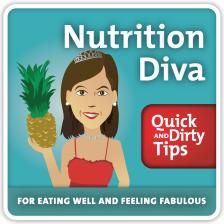Can Lutein Supplements Protect Your Eyes?
Macular degeneration is the leading cause of vision loss. Will special vitamin supplements protect your eyes? Nutrition Diva tackels a reader question.
Nutrition Diva listener Gary sent in a doozy of a question. He writes:
“Every year, when I go for my vision check-up, my eye doctor recommends a special vitamin supplement that’s supposed to protect my eyes — specifically, one she sells in her office. Every year I decline, indicating that I eat the recommended servings of vegetables and fruits (which, as you confirmed in a recent post) should be sufficient.
This year, she challenged me on this, citing new research showing that even a healthy diet does not provide enough zeaxanthin and meso-zeaxanthin to protect eye health. The supplement she sells, of course, provided the solution. Would you comment on whether we really need these nutrients, which foods provide them, as well as the apparent conflict of interest involved in a health care professional selling supplements.”
Sponsor: Squarespace, the all-in-one platform that makes it fast and easy to create your own professional website, e-commerce site, or online portfolio. For a free trial and 10% off, go to squarespace.com/diva and use offer code Diva1.
Should Doctors Sell Supplements?
Let’s start with the question of whether it’s a conflict of interest for doctors to sell vitamin supplements to their patients. Although it is a subject of great controversy within the profession, it is not illegal for health care professionals to sell products to their patients. Most doctors who sell vitamins or other products insist that patient care is their primary motive. They argue that making products available in their offices makes it easier for patients to follow through on their recommendations and ensures that patients end up with high-quality supplements.
Although I don’t doubt the good intentions and integrity of doctors who sell vitamins, it’s difficult for them to be objective about whether the benefit to the patient justifies the cost.
However, there is no denying that such product sales can be a significant source of revenue for medical offices and that this presents a clear conflict of interest. One way I’ve seen doctors navigate around this conundrum is to offer supplements to patients at their own cost — but this is hardly the norm. In a world where medical offices are struggling to find a workable business model, the profits to be made on supplements and other products have become increasingly attractive — even essential.
This whole dilemma was thorny enough when everyone was more-or-less in agreeement that vitamin supplements were beneficial. Now, of course, we have a growing controversy over whether vitamin supplements actually improve your health. No matter which side of this passionate debate you’re on, you can find evidence to support your view. And that makes it increasingly important that those whom we’re trusting to weigh the evidence for us have no dog in the fight.
Although I don’t doubt the good intentions and integrity of (most) doctors who sell vitamins, I think it’s even more difficult for them to be truly objective about whether the benefit (to the patient) justifies the cost. Even when there is no profit motive involved, we all have biases and beliefs that affect how we evaluate information — and even which information we choose to evaluate.
I try to base my opinions about health and nutrition on the available evidence. But I have to admit that once I’ve arrived at a point of view, new evidence that supports my position gets my attention more easily and seems more convincing. I’m much more critical or dismissive of findings that don’t confirm my preconceived notions. It’s just part of being human — and something I try to correct for.
Enough philosophy! Let’s take a closer look at the specific nutrients Gary’s doctor recommended….
Do You Need a Supplement to Protect Your Eyes?

In the body, these nutrients tend to concentrate in the tissues of the eye, where they protect against damage from ultraviolet radiation. People whose diets are high in these nutrients (meaning, people who eat a good amount and variety of fruits and vegetables) have a lower risk of cataracts, macular degeneration, and other age-related eye diseases.
Results of the AREDS2 Study
The problem is that most people don’t eat a good amount and variety of fruits and vegetables. And here’s where eye health supplements come into the picture. A big study, called the Age-Related Eye Disease Study, or AREDS2, took a look at whether supplements containing lutein and zeaxanthin could help reduce vision loss by closing the gap between recommended intakes and actual intakes.

There was one other extremely interesting finding in this study that deserves mentioning. Taking beta-carotene supplements seemed to reduce the benefit of supplemental lutein and zeaxanthin. Researchers wonder whether concentrated doses of beta-carotene might inhibit the absorption of the other carotenoids. This does not seem to affect people who get their carotenoids from diet rather than supplements — yet another argument for getting our nutrition from foods, not pills.
The Bottom Line on Eye Health Supplements

If you — for whatever reason — simply cannot or will not eat the recommended amount of fruits and vegetables, a supplement containing lutein and zeaxanthin (but not beta-carotene) would certainly be better than nothing. Just remember that no supplement can match the benefits of a diet rich in fruits and vegetables — and not just for your eyes but for every cell and organ in your body.
Even if you fall short of the recommended 5 servings of vegetables and 2-4 servings of fruit a day, every serving you do eat moves you closer to health — so, even if you do decide to take a supplement, keep trying to work more greens (and reds, and yellows, and purples) into your day.
See also: How to Get More Vegetables into Your Diet
Post your comments, questions, and or topic suggestions below, or join the conversation on the Nutrition Diva Facebook page. I always love to hear from you!
And don’t forget to subscribe to my free weekly newsletter for more nutrition tips, recipes, and answers to your questions.
Have a great week and eat something good for me!
Playing in kitchen image courtesy of Shutterstock.








